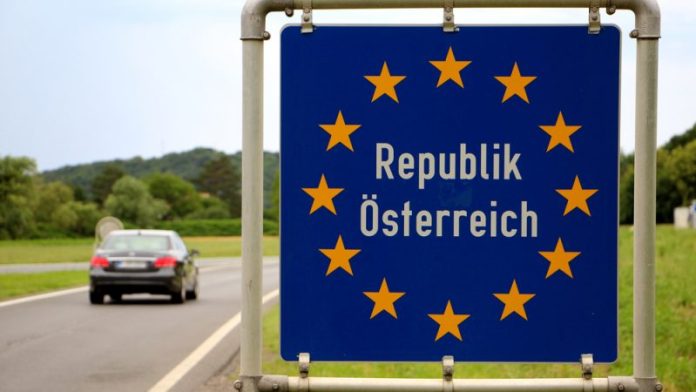Slovenia’s government reports: Austria’s control of the internal Schengen border with Slovenia is an “ineffective” and “disproportionate” measure, according to Schengen News.
Controls at the 330-kilometre border separating the two EU states have been in place for eight years since 2015, but Vienna has notified the EU Commission 18 times to extend controls at internal borders with its neighbours Slovenia and Hungary.
Such a measure “does not effectively prevent migration” because Slovenian police have not detected an increase in illegal crossings at the common border with Austria and the number of joint borders is insignificant, according to the Slovenian government. For instance, 58 people were returned from Austria in 2022, 70 in 2021 and 176 in 2020.
However, the Schengen area remains important: border controls should be replaced by other measures such as joint patrols, enhanced in-depth controls and other joint actions and risk-based exercises, considering the Schengen area as one of the most important achievements of the E.U. that “must be preserved.”
The temporary reinstatement of border controls at internal borders should be applied as a last resort in exceptional situations and should comply with the principle of proportionality, with Member States obliged to give prior notice to the Commission and other Member States at least four weeks before introducing such an extension.
Austria pays particular attention to the land borders with Italy, Hungary, Slovenia and Slovakia, Austria’s first notification of the temporary reinstatement of border controls due to the large influx of persons seeking international protection.
These have been updated every six months since then and are still in force today. On the other hand, Ljubljana believes that controls should only be imposed as a last resort, as stipulated in the Schengen Border Code.
Slovenia’s position is that control at the EU’s internal borders should only be introduced as a measure of last resort and that it should be proportionate to pertinent threats identified, and above all, it should be temporary and lifted as soon as the conditions for it are no longer met, according to Slovenia’s government.
The Government argues that the Austrian Ministry of the Interior failed to prove the existence of a new serious threat in its latest decision to extend the border controls and, accordingly, the restrictions should be lifted.
The position of the Government of the Republic of Slovenia is that Austria should take into account the principles of necessity and proportionality when extending temporary control at the Slovenian-Austrian border, as also pointed out by the Prime Minister of the Republic of Slovenia, Dr Robert Golob, during his official visit to Austria in June this year.
Based on the identified serious threat, Frontex and Europol will be involved in the risk assessment and consultation procedure after receiving an opinion from the Commission or the Member State, but Slovenia reiterated its opposition to this course of action.
The Slovenian government told SchengenVisaInfo.com that in April this year, Interior Minister Boštjan Poklukar sent a letter to Ilva Johansson, Commissioner for Home Affairs, and Margaritis Schinas, Vice-President for the Promotion of European Lifestyles. It was stated that the rule of law should be restored immediately, emphasising that the government had initiated a formal consultation procedure.
Slovenia has thus launched a formal consultation procedure under Article 27 of the Schengen Borders Code. In May 2023, the first trilateral meeting between representatives of the two countries and the Commission took place, with Slovenia actively participating and making proposals to resolve the situation.
Thus, on 12 April Austria notified its decision to extend border controls with Hungary and Slovenia for a further six months from 12 May 2023, the European Commission told SchengenVisaInfo.com that its position was clear: “Reintroducing border controls must remain exceptional, strictly limited in time and a measure of last resort if a serious threat to public policy or internal security has been established.”
In order to assess whether internal border controls are necessary and proportionate, and based on the existence of a new serious threat affecting public policy or internal security, the Commission has launched a formal consultation process, which is to continue:
The Commission will continue the dialogue with the Member States concerned to clarify which are the new threats, necessity and proportionality of reintroduced border controls in response to these threats, the European Commission reports.
In April this year, Slovenian President Natasa Pirc Musar warned that Ljubljana would turn to Brussels if Austria retained border controls: “If we don’t reach an agreement soon, I fear that the first measure will be a notification to the EU Commission and corresponding further steps within the Brussels administration.”
A month later, the European Commission warned Austria with legal action over the extension of border controls, while launching a formal consultation procedure with all EU countries concerned, but Austrian authorities again extended border controls on the border with Slovenia and Hungary until at least 11 November.
Fears of illegal migration forced the Austrian authorities to impose controls not only with Slovenia, but also with Slovakia, Hungary and Italy. These concerns led the Vienna authorities to oppose the expansion of the Schengen area, in particular the inclusion of Bulgaria and Romania.
As long as the system Schengen “does not work, there is no point in expanding it. Migration pressure remains high. This means that the external border protection clearly does not work. Against this background and from today’s point of view, Austria cannot support the accession of Bulgaria and Romania at this stage, according to Austria’s Interior Ministry.
In the first nine months of this year, 279,350 attempts at illegal border crossings were detected at the EU’s external borders, with the Western Balkan route being the second most active, with more than 81,800 cases, according to the European Union Border and Coast Guard Agency.
At the same time, the war between Israel and Hamas, as well as attempts at illegal border crossings, has prompted a number of EU countries to reinstate border controls, with Slovenia, Croatia and Italy becoming the latest EU countries to introduce such measures.
